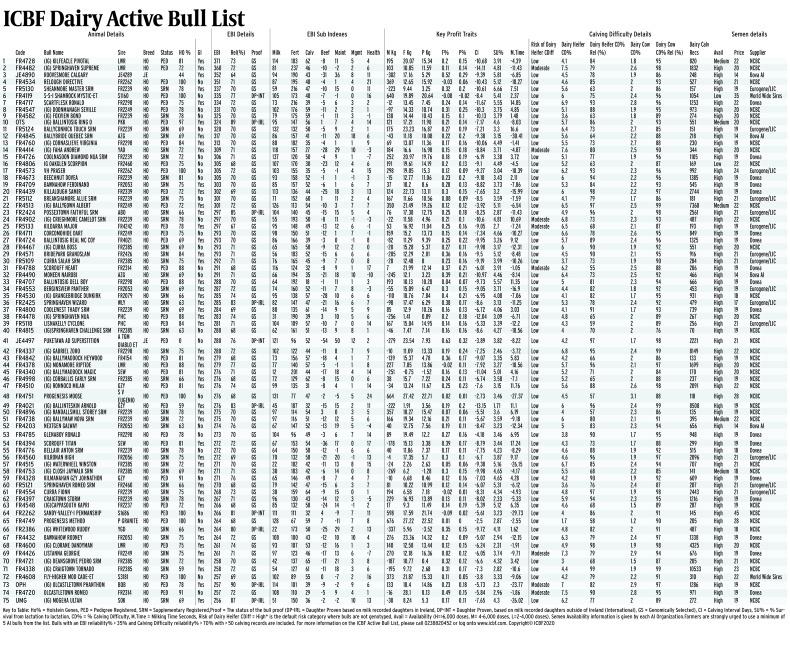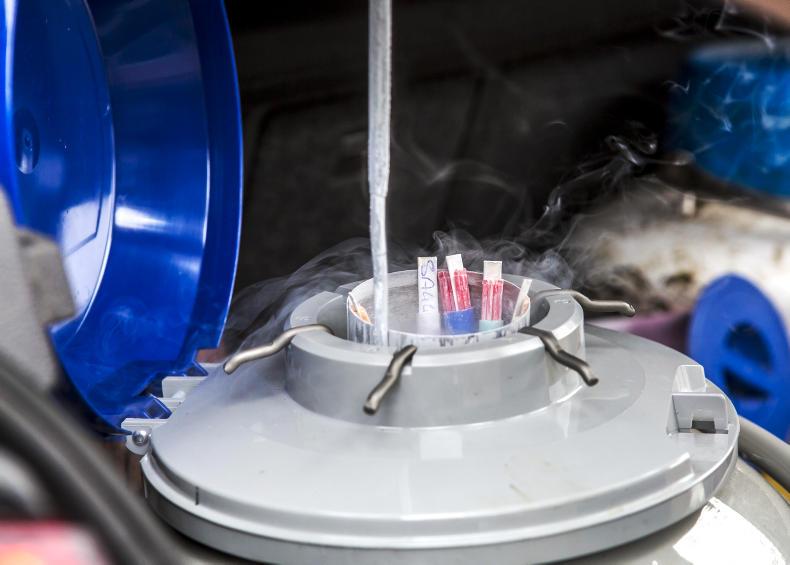The EBI details of the 75 bulls listed are based on the March 2020 genetic evaluations computed by ICBF. Semen from each bull has been indicated as available by the AI companies, hence the term ‘Active’ Bull List.

The criteria for making the list is as follows:
EBI reliability greater than or equal to 35%.Calving difficulty reliability greater than or equal to 70% (based on 23% heifer and 77% cow reliability).At least 50 calving records, either in Ireland or in the bull’s country of origin. This year is the 20th year of ICBF’s Spring Active Bull List. There are now 67 Irish bred bulls on the list. This means that nearly 90% of the bulls on our national dairy bull list were bred here in Ireland.
This wasn’t always the case. In 2001, there were just two bulls on the list bred here in Ireland. Holland, France, New Zealand and America have generally been where most of the bulls on the list have come from.
This trend started to change around 2009, when the first of the Gene Ireland Irish progeny-tested bulls started to come through. Foreign bred bulls this year come from: Canada (four), USA (two), Britain (one) and New Zealand (one).
This year’s list is made up of 73 Holstein/Friesian bulls, one pure-bred and one cross-bred Jersey bull. The 75 bulls have breeding values for EBI and the seven sub-indices, together with trait information on 10 key profit traits. All of the bulls are genotyped and none of them are carriers of genetic defects such as CVM or BLAD.
The 75 bulls on the list have EBIs that range from €371 down to €256.
Of all the bulls on the list, 49 (65%) came through Gene Ireland. There are 65 ‘Genomically Selected’ (GS) bulls. Seven of the bulls are daughter-proven in Ireland (DP-IRL) and three are Daughter Proven with foreign daughters (DP-INT).
Guide to reading the table
Bull details: Rank, AI Code, Bull Name, Sire, Breed, Status in Herdbook and Holstein percentage. Ped: Full pedigree registered animal. SRM: Supplementary registered male in the IHFA Herdbook. Male progeny of these bulls will also be supplementary registered. Female progeny will be given the ASR registration status. An XSR or blank status field indicates that the bull has no pedigree registration status.GI: This indicates if the bull was progeny tested through the ICBF Gene Ireland progeny test programme.EBI details: EBI, Economic Breeding Index (€) indicates the profit/lactation expected for a bull’s progeny compared to an average animal. Rel percentage: Reliability of EBI proof. This indicates the level of confidence that someone can have in the proof. The higher this value, the more reliable the proof. Proof: The status of the bull proof. EBI sub indices: Milk, Fertility, Calving, Beef, Maintenance, Management and Health are sub indices of the overall EBI. Added together, they give the overall EBI figure. Key profit traits: M kg Predicted Difference (PD) for milk yield. If the average milk kg of the team of bulls being used is greater than the average milk kg of the cows they are being mated to, then the average milk yield of the herd will increase. Positive values for F Kg (Fat kg), P Kg (Protein kg), F percentage (Fat percentage) and P percentage (Protein percentage) will also increase each of the constituent traits in the same manner. CI: Calving interval (days). Bulls with negative values for CI will reduce calving interval. SU: Survival percentage. Bulls with positive values will increase survival (longevity/productive life).Milking time: This indicates whether daughters of a bull are slow or quick to milk. Negative values are desired, indicating that daughters take less time to be milked. Milking time is measured in seconds per milking. It is important to note that milking time has been adjusted for milk yield, so it’s not penalizing bulls with high volumes of milk.
Calving difficulty details: This is the first Active Bull List with the new calving indices.Risk of dairy heifer CDiff: This is either low, moderate or high and indicates the level of risk associated with calving difficulty when used on dairy heifers. It combines the PTA and the reliability.Dairy heifer CD percentage and dairy cow CD percentage: This shows the calving difficulty percentage figure expected for the bull when used on dairy heifers and dairy cows. Reliability percentage figures are also shown.Dairy calv recs: This shows the number of actual calves sired by each bull that were born in Ireland out of dairy animals, with calving survey records included in evaluations.Semen details: The price, availability and supplier of each bull are also included. These details are updated by each AI organisation for their own bulls. Read more
Watch: all systems go in Wexford
Kerry lifts milk price but doesn’t make the top
The EBI details of the 75 bulls listed are based on the March 2020 genetic evaluations computed by ICBF. Semen from each bull has been indicated as available by the AI companies, hence the term ‘Active’ Bull List.

The criteria for making the list is as follows:
EBI reliability greater than or equal to 35%.Calving difficulty reliability greater than or equal to 70% (based on 23% heifer and 77% cow reliability).At least 50 calving records, either in Ireland or in the bull’s country of origin. This year is the 20th year of ICBF’s Spring Active Bull List. There are now 67 Irish bred bulls on the list. This means that nearly 90% of the bulls on our national dairy bull list were bred here in Ireland.
This wasn’t always the case. In 2001, there were just two bulls on the list bred here in Ireland. Holland, France, New Zealand and America have generally been where most of the bulls on the list have come from.
This trend started to change around 2009, when the first of the Gene Ireland Irish progeny-tested bulls started to come through. Foreign bred bulls this year come from: Canada (four), USA (two), Britain (one) and New Zealand (one).
This year’s list is made up of 73 Holstein/Friesian bulls, one pure-bred and one cross-bred Jersey bull. The 75 bulls have breeding values for EBI and the seven sub-indices, together with trait information on 10 key profit traits. All of the bulls are genotyped and none of them are carriers of genetic defects such as CVM or BLAD.
The 75 bulls on the list have EBIs that range from €371 down to €256.
Of all the bulls on the list, 49 (65%) came through Gene Ireland. There are 65 ‘Genomically Selected’ (GS) bulls. Seven of the bulls are daughter-proven in Ireland (DP-IRL) and three are Daughter Proven with foreign daughters (DP-INT).
Guide to reading the table
Bull details: Rank, AI Code, Bull Name, Sire, Breed, Status in Herdbook and Holstein percentage. Ped: Full pedigree registered animal. SRM: Supplementary registered male in the IHFA Herdbook. Male progeny of these bulls will also be supplementary registered. Female progeny will be given the ASR registration status. An XSR or blank status field indicates that the bull has no pedigree registration status.GI: This indicates if the bull was progeny tested through the ICBF Gene Ireland progeny test programme.EBI details: EBI, Economic Breeding Index (€) indicates the profit/lactation expected for a bull’s progeny compared to an average animal. Rel percentage: Reliability of EBI proof. This indicates the level of confidence that someone can have in the proof. The higher this value, the more reliable the proof. Proof: The status of the bull proof. EBI sub indices: Milk, Fertility, Calving, Beef, Maintenance, Management and Health are sub indices of the overall EBI. Added together, they give the overall EBI figure. Key profit traits: M kg Predicted Difference (PD) for milk yield. If the average milk kg of the team of bulls being used is greater than the average milk kg of the cows they are being mated to, then the average milk yield of the herd will increase. Positive values for F Kg (Fat kg), P Kg (Protein kg), F percentage (Fat percentage) and P percentage (Protein percentage) will also increase each of the constituent traits in the same manner. CI: Calving interval (days). Bulls with negative values for CI will reduce calving interval. SU: Survival percentage. Bulls with positive values will increase survival (longevity/productive life).Milking time: This indicates whether daughters of a bull are slow or quick to milk. Negative values are desired, indicating that daughters take less time to be milked. Milking time is measured in seconds per milking. It is important to note that milking time has been adjusted for milk yield, so it’s not penalizing bulls with high volumes of milk.
Calving difficulty details: This is the first Active Bull List with the new calving indices.Risk of dairy heifer CDiff: This is either low, moderate or high and indicates the level of risk associated with calving difficulty when used on dairy heifers. It combines the PTA and the reliability.Dairy heifer CD percentage and dairy cow CD percentage: This shows the calving difficulty percentage figure expected for the bull when used on dairy heifers and dairy cows. Reliability percentage figures are also shown.Dairy calv recs: This shows the number of actual calves sired by each bull that were born in Ireland out of dairy animals, with calving survey records included in evaluations.Semen details: The price, availability and supplier of each bull are also included. These details are updated by each AI organisation for their own bulls. Read more
Watch: all systems go in Wexford
Kerry lifts milk price but doesn’t make the top







 This is a subscriber-only article
This is a subscriber-only article










SHARING OPTIONS: